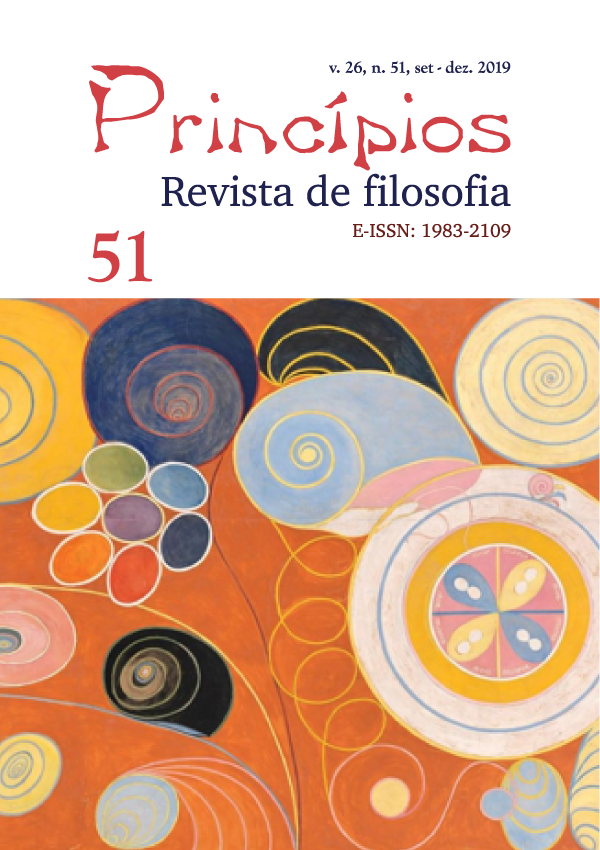The Role of Understanding in Accepting Scientific Theories
DOI:
https://doi.org/10.21680/1983-2109.2019v26n51ID17020Keywords:
Epistemic Virtue, Epistemic Agent, Truth, Propositional, Non-PropositionalAbstract
The acceptance criterion of a scientific theory must be guided on its Understanding. That is so because the acceptance conception of scientific theories based on the expression of epistemic values is not possible, given the incommensurability issue. To solve this matter we must consider the epistemic agent competences and how these sustain its acceptance. In analyzing the choosing process of scientific theories, one must conclude that it is not associated with the mere belief formation on its empirical adequation. Thus being a process not bound to the truth, but associated with the best explanation, therefore generating the best Understanding, which is logically and conceptually, necessary aspect on acceptance of a given cognitive state consequent of an Explanation. Since the Understanding is a characteristic of a virtuous agent, we must believe that the chosen theory would be a result of the ability of a virtuous agent, and therefore a reliable theory.
Downloads
References
COHEN, L. J. An Essay on Belief and Acceptance. Oxford: Oxford University Press, 1992.
COHEN, L. J. Why Acceptance that P Does Not Entail Belief that P. In: ENGEL, P. (Ed.). . Beliving and Accepting. Philosophi ed. Dordrecht, Netherlands: Kluwer Academic, 2000. p. 55–65.
ELGIN, C. Z. Epistemic agency. Theory and Research in Education, v. 11, n. 2, p. 135–152, 2013.
ENGEL, P. Beliving and Accepting. First Edit ed. Dordrecht, Netherlands: Kluwer Acedemic, 2000.
FERREIRA, T. A. DA S. Entendimento , Conhecimento e Autonomia?: Virtudes Intelectuais e o Objetivo do Ensino de Ciências. [s.l.] UFBA, 2015.
FRAASSEN, B. C. VAN. A Imagem Científica. São Paulo, SP: Fundação Editora da UNESP, 2006.
GODFREY-SMITH, P. Theory and Reality - an introduction to the philosophy of science. Chicago, Illinois: The University of Chicago Press, 2003.
IVANOVA, M. Is There a Place for Epistemic Virtues in Theory Choice? In: FAIRWEATHER, A. (Ed.). . Virtue Epistemlogy Naturalized. Volume 336 ed. [s.l.] Splinger, 2014. p. 207–227.
KUHN, T. A estrutura das revoluções científicas. 5a ed. São Paulo, SP: Editora Perspectiva, 1998.
LACEY, H. Is Science Value Free?? First ed. Lodon: Routledge, 1999.
LEHRER, K. Justification, Cohenrence and Knowledge. Erkenntnis, v. 50, p. 243–258, 1999.
LEHRER, K. Acceptance and Belief Revisited. In: ENGEL, P. (Ed.). . Beliving and Accepting. First Edit ed. Dordrecht, Netherlands: Kluwer Acedemic, 2000. p. 209–220.
PRITCHARD, D. Recent work on epistemic value. American Philosophical Quartely, v. 44, n. 2, p. 85–110, 2007.
RIGGS, W. D. Understanding “Virtue” and the Virtue of Understanging. In: ZAGZEBSKI, L.; DEPAUL, M. (Eds.). . Intelectual Virtue. Paperback ed. Oxford: Oxford University Press, 2007. p. 203–226.
SAINSBURY, M. Fiction and Acceptance-Relative Truth, Belief and Assertion. n. 1, 1970.
ZAGZEBSKI, L. Recovering Understanding. In: STEUP, M. (Ed.). . Knowledge, Truth and Duty: Essays on Epistemic Justification, Responsability and Virtue. Oxford: Oxford University Press, 2001. p. 235–251.
Downloads
Published
How to Cite
Issue
Section
License
Authors retain copyright and grant the journal right of first publication with the work simultaneously licensed under a Creative Commons Attribution License that allows others to share the work with an acknowledgement of the work's authorship and initial publication in this journal.


 Português (Brasil)
Português (Brasil) English
English Español (España)
Español (España) Français (Canada)
Français (Canada)


